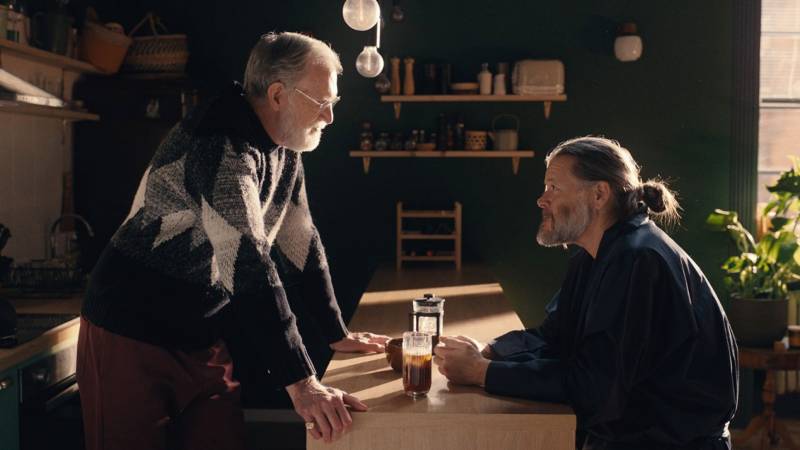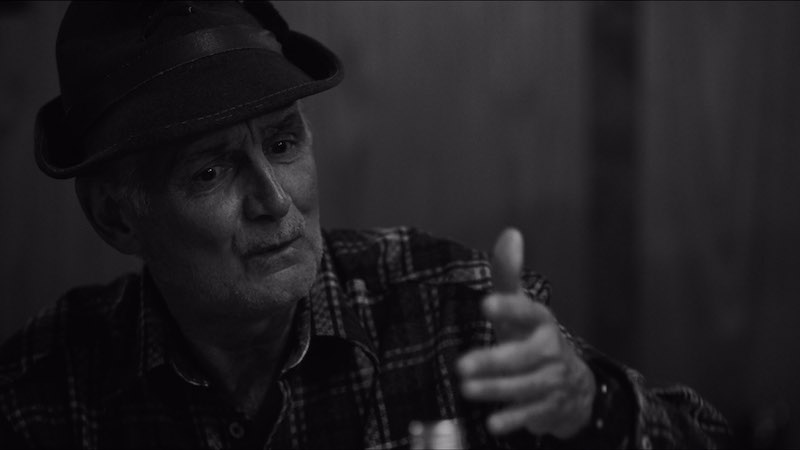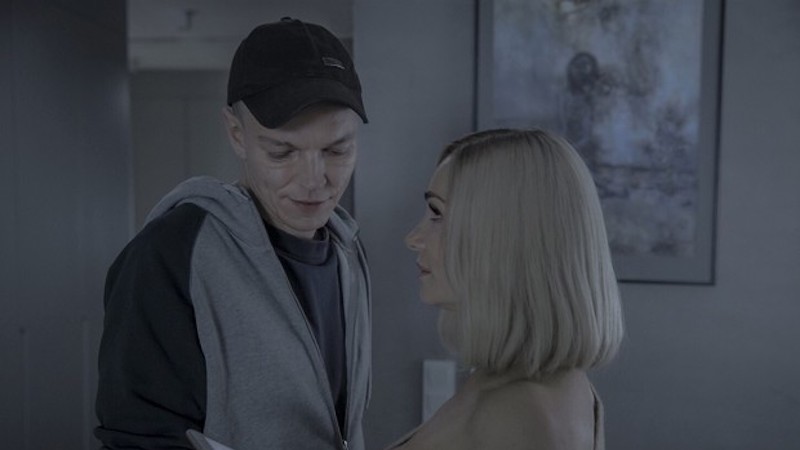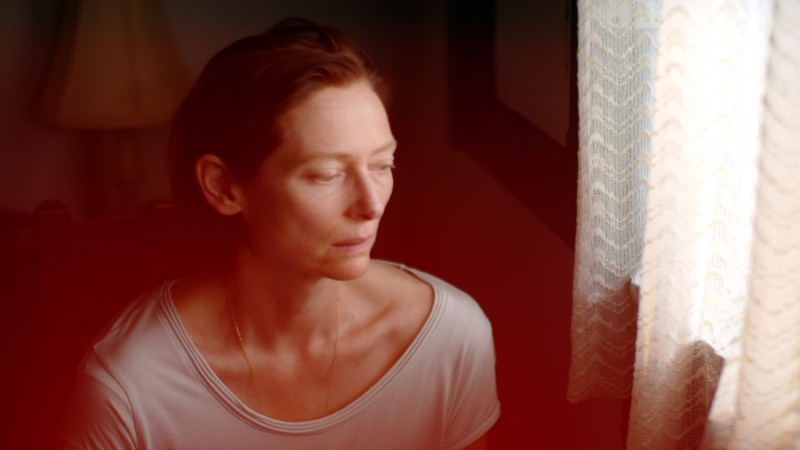Lithuanian director Romas Zabarauskas’s beautifully reflective fourth feature The Writer (Kirjanik, 2023) is a conversational piece, which hits upon themes and ideas that land with a weighty delivery. The director came out as gay in 2011 when he premiered his first film Porno Melodrama. He is likely the most prominent LGBT filmmaker of the Baltics.
Thirty years ago, Russian born Kostas (Bruce Ross) migrated from Lithuania to the United States, leaving behind his lover, Dima (Jamie Day), who he met during their mandatory service in the Soviet army. Following the publication of Kosta’s new book, 1990, Dima arrives in New York under the pretence of a job interview. The real reason he’s travelled to the United States is to discuss Kostas’ latest work. The film is predominantly two characters talking in an apartment. Zabarauskas and his co-writers, Marc David Jacobs, Anastasia Sosunova and Artūras Tereškinas, invite the audience to eavesdrop on their private and intimate conversation, first in public, then in private, when Kostas invites Dima back to his place for dinner.
Throughout the concise 85-minute running time, they discuss immigration, sex and work, their nationalities, families, and relationship. This infuses the film with an insightful and introspective energy. The film’s driving interest is the idea of how we’re defined by our choices, for better or worse, but it’s effectively supported by broad themes and ideas. One such idea is how we carry our pasts with us, even as we build our future, and to understand our own story requires us to understand the story of those dearest to us.
Speaking with DMovies, Zabarauskas discussed a trilogy of films about queer male couples, how he’s drawn to political dilemmas and is open to different ways of interpreting his films.
…
.
Paul Risker – Why filmmaking as a means of creative expression? Was there an inspirational or defining moment for you personally?
Romas Zabarauskas – I don’t really see filmmaking as a means of creative expression, because that would seem to imply that an artwork is an extension of the inner world of its creator, which I don’t think is necessarily the case. For me, cinema is a form of art and entertainment rather than creativity. There wasn’t a particular moment that inspired me, but I did watch a lot of great movies in a local library as a teen, fascinated by the diversity of their visions.
PR – What was the seed of the idea for The Writer, and would you agree that there are three versions of a film – the one that is written, the one that is shot and the one that is edited?
RZ – No, I don’t agree with that. There is only one film, and how it was made is simply a question of the behind-the-scenes. In my case, writing the script is like creating an itinerary, but it would be foolish to follow the map blindly when going on a trip. If I see something beautiful on my way, I’ll stop by.
PR – How do you compare and contrast The Writer to your previous films?
RZ – I’m truly grateful for all the opportunities I had to make these films, each a unique challenge. The Writer will form a trilogy on queer male couples in different political circumstances, preceded by The Lawyer (2020) and to be followed with The Activist, which we also shot this year. The Writer stands out as my first fully English [language] film, a co-production with the United States, and a SAG-AFTRA signatory. It was also an opportunity to explore the art of the dialogue to the fullest. I think all my films have a similar approach of focusing on complex political dilemmas and lush visuals.
PR – The premise of The Writer contextualises it as a voyeuristic work. Would you agree?
RZ – I didn’t really conceptualise it this way, but I’m always fascinated to learn about any possible interpretations. For me, one of the unique qualities of film is that you can feel what the characters are thinking, thus allowing for the dramatic qualities to be experienced in a special way.

PR – Kostas and Dima don’t talk like people in a film talk and it feels as if you’re merging the film and theatrical forms.
RZ – Well, I don’t think there is a single way that people talk in films. That said, yes, I love theatre and the theatre tradition in Lithuania is very strong, although to be honest it’s a lot more experimental than The Writer’s approach. If you think I’m merging the film and theatrical forms that’s fine by me. I don’t – I just think that a large part of cinema continues a timeless tradition of drama-based work, in unique ways that don’t diminish the cinematic experience. I was inspired by filmmakers like [Alain] Resnais, [Eric] Rohmer, [John] Cassavetes, but also American classics shot on soundstages (Hitchcock, Wilder, etc.), and sitcoms.
PR – One of the enthralling disagreements the pair engage in is over the legitimacy of choice. Does either Kostas or Dima align with your own views on this subject?
RZ – My views are closer to Dima’s. I’m an optimist, and while I think it’s important to admit one’s privileges and societal obstacles, it’s equally important to strive for personal and political progress. But some of my co-writers would likely disagree with me, which is awesome, too.
PR – What do you think the appeal is of stories like The Writer that are predominantly a conversation between characters?
RZ – To be honest, I don’t think that such a format itself is a winning or losing proposition – it depends on the film. In our case, it allowed us to truly delve into intimacy as well as complex views of the two characters.
PR – In The Writer, you explore how ideas are malleable, how they’re filtered through the subjective gazes, and the messy, non-linear nature of relationships.
RZ – Sure, but it wasn’t my goal to somehow show that everything is subjective and so nothing can be true. It was important to me to represent two different people with often opposing yet nuanced political views, clearly disagreeing but still staying civil about it.
PR – A British filmmaker called Carol Morley once told me: “You take it [a film] 90% of the way, and it is the audience that finishes it. So the audience by bringing themselves: their experiences, opinions and everything else to a film is what completes it.” Would you agree that there is a transfer of ownership? Is making a film a transformative experience?
TZ – I agree, in a sense – during our premiere in Tallinn, it truly felt like the audience’s reactions made the film happen. There was a lot of laughter, and after the screening I kept hearing about different ways the audience members connected to our film. However, it’s important to be careful with any metaphors when describing cinema. Ultimately, it’s a film, a work of art and entertainment, for people to watch, enjoy and discuss. It doesn’t need to be renamed in different ways – cinema is already a magic experience, and people know it.
…
.
The Writer played in the Baltic Film Competition of the 27th Tallinn Black Nights Film Festival. Just click here in order to read our exclusive movie review.
Romas Zabarauskas is pictured at the top of this interview, snapped by Arcana Femina. The other image is a still of The Writer.












